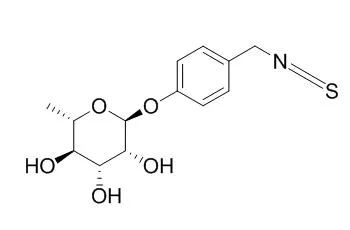| In vitro: |
| Fitoterapia. 2016 Jul;112:104-15. | | Anti-inflammatory and antioxidant effects of a combination of cannabidiol and moringin in LPS-stimulated macrophages.[Pubmed: 27215129 ] | Inflammatory response plays an important role in the activation and progress of many debilitating diseases. Natural products, like cannabidiol, a constituent of Cannabis sativa, and Moringin, an isothiocyanate obtained from myrosinase-mediated hydrolysis of the glucosinolate precursor glucoMoringin present in Moringa oleifera seeds, are well known antioxidants also endowed with anti-inflammatory activity.
METHODS AND RESULTS:
This is due to a covalent-based mechanism for ITC, while non-covalent interactions underlie the activity of CBD. Since these two mechanisms are distinct, and the molecular endpoints are potentially complementary, we investigated in a comparative way the protective effect of these compounds alone or in combination on lipopolysaccharide-stimulated murine macrophages. Our results show that the cannabidiol (5μM) and Moringin (5μM) combination outperformed the single constituents that, at this dosage had only a moderate efficacy on inflammatory (Tumor necrosis factor-α, Interleukin-10) and oxidative markers (inducible nitric oxide synthase, nuclear factor erythroid 2-related factor 2, nitrotyrosine). Significant upregulation of Bcl-2 and downregulation of Bax and cleaved caspase-3 was observed in cells treated with cannabidiol-Moringin combination.
Treatment with the transient receptor potential vanilloid receptor 1 antagonist was detrimental for the efficacy of cannabidiol, while no effect was elicited by cannabinoid receptor 1 and cannabinoid receptor 2 antagonists. None of these receptors was involved in the activity of Moringin.
CONCLUSIONS:
Taken together, our in vitro results testify the anti-inflammatory, antioxidative, and anti-apoptotic effects of the combination of cannabidiol and Moringin. | | Fitoterapia. 2016 Apr;110:1-7. | | Anticancer activity of glucomoringin isothiocyanate in human malignant astrocytoma cells.[Pubmed: 26882972] | Isothiocyanates (ITCs) released from their glucosinolate precursors have been shown to inhibit tumorigenesis and they have received significant attention as potential chemotherapeutic agents against cancer. Astrocytoma grade IV is the most frequent and most malignant primary brain tumor in adults without any curative treatment. New therapeutic drugs are therefore urgently required.
METHODS AND RESULTS:
In the present study, we investigated the in vitro antitumor activity of the glycosylated isothiocyanate Moringin [4-(α-l-rhamnopyranosyloxy)benzyl isothiocyanate] produced from quantitative myrosinase-induced hydrolysis of glucoMoringin (GMG) under neutral pH value. We have evaluated the potency of Moringin on apoptosis induction and cell death in human astrocytoma grade IV CCF-STTG1 cells. Moringin showed to be effective in inducing apoptosis through p53 and Bax activation and Bcl-2 inhibition. In addition, oxidative stress related Nrf2 transcription factor and its upstream regulator CK2 alpha expressions were modulated at higher doses, which indicated the involvement of oxidative stress-mediated apoptosis induced by Moringin. Moreover, significant reduction in 5S rRNA was noticed with Moringin treatment.
CONCLUSIONS:
Our in vitro results demonstrated the antitumor efficacy of Moringin derived from myrosinase-hydrolysis of GMG in human malignant astrocytoma cells. |
|






 Cell. 2018 Jan 11;172(1-2):249-261.e12. doi: 10.1016/j.cell.2017.12.019.IF=36.216(2019)
Cell. 2018 Jan 11;172(1-2):249-261.e12. doi: 10.1016/j.cell.2017.12.019.IF=36.216(2019) Cell Metab. 2020 Mar 3;31(3):534-548.e5. doi: 10.1016/j.cmet.2020.01.002.IF=22.415(2019)
Cell Metab. 2020 Mar 3;31(3):534-548.e5. doi: 10.1016/j.cmet.2020.01.002.IF=22.415(2019) Mol Cell. 2017 Nov 16;68(4):673-685.e6. doi: 10.1016/j.molcel.2017.10.022.IF=14.548(2019)
Mol Cell. 2017 Nov 16;68(4):673-685.e6. doi: 10.1016/j.molcel.2017.10.022.IF=14.548(2019)